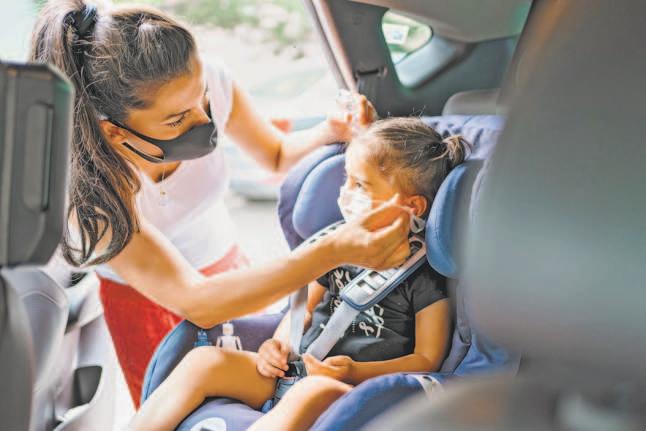
5 minute read
RISK FACTORS
UP FRONT | TRAVEL
USA TODAY SPECIAL EDITION
Advertisement
How COVID-19 will reshape your next trip
By Curtis Tate
RAVEL IN THE MIDDLE of a
Tglobal pandemic presents challenges, with each activity carrying its own level of risk for contracting the virus.
Joseph Khabbaza, a pulmonary and critical care physician who treats coronavirus patients at the Cleveland Clinic, says the primary path of transmission is contact with respiratory droplets spread by infected people. Face masks, physical distancing, frequent hand-washing and cleaning of surfaces have become standard across the travel sector.
“Every industry has interventions in
GETTY IMAGES
place to make things safer,” Khabbaza says. “Companies are bringing in outside health experts. That can be a little bit reassuring.”
Khabbaza offers his thoughts on the relative risks of different travel activities and best practices: AIR TRAVEL
In spite of all the precautions now in place, he says flying offers the most potential for exposure to the coronavirus because of the nature of how planes are configured.
“Once you’re in the cabin, you don’t know who’s on the plane,” he adds. “You’re in relative closer proximity to
USA TODAY SPECIAL EDITION
people you don’t know.”
Still, he says, flying is safer than it was earlier in the pandemic because of the changes airlines have made.
“It is as safe as they can make it,” Khabbaza says.
In addition to spacing and sanitizing, he says face masks add an extra layer of protection from the virus. Most U.S. carriers now require passengers to wear them.
TRAINS AND BUSES
Surface transportation presents similar challenges to those in aviation, Khabbaza says.
Like the airlines, Amtrak and intercity bus operators like Greyhound and Peter Pan are requiring passengers to wear face masks. They’re promoting physical distancing when possible and cleaning and disinfecting high-touch surfaces more often.
CRUISE SHIPS
Cruise ships remain a concern for travelers, as passengers continue to contract the disease on board, but Khabbaza says companies are putting new precautions in place, which should limit contamination as long as passengers and crew members adhere to them.
“It involves buy-in from everyone,” he says.
Cruise ship passengers can stay separate from other groups on the ship by staying in their rooms. Common areas of the ship offer space for distancing, and outdoor activities are inherently less risky for disease transmission, Khabbaza says.
The elimination of buffet food service, a move under consideration by multiple cruise lines, would remove a point of potential transmission not only for the coronavirus, but also for the foodborne illnesses that have long plagued cruise ship operations, Khabbaza notes. THEME PARKS
As some of the nation’s larger theme parks reopen, such as those run by Universal and Disney, they are taking precautions.
Overall, Khabbaza says theme parks are at the safer end of the spectrum. Why? Theme parks are universally implementing changes that include social distancing, mandatory face masks, the increased availability of hand sanitizer and the increased disinfection of highUP FRONT | TRAVEL
contact surfaces.
Disney World in Florida canceled events such as parades, fireworks displays and its big Halloween celebration that draw large crowds and closed attractions that involve person-to-person contact.
Theme parks are also mostly outdoors, posing a lower risk than enclosed spaces. They’re also limiting the number of visitors who can enter.
“Less people is definitely better than more people,” he says. ROAD TRIPS
Khabbaza advises taking precautions every time you step out of the car, whether for gas, food or a rest break.
He also recommends using hand sanitizer every time you pump gas and discourages using your phone while you’re doing it.
“Even locally, that’s a very important practice,” he says.
With adults or older children, Khabbaza says it should be safe to visit convenience stores and restaurants.
With younger kids, he says take them to the restroom and then back to the car to eat. That minimizes their exposure to surfaces and items where infected droplets may have fallen. HOTELS
Hotels have increased their cleaning and disinfecting procedures for hightouch surfaces and common areas, as well as encouraged physical distancing. They’ve recommended online check-in and automatic checkout to eliminate face-to-face interactions. They’ve sealed items in rooms, such as coffee cups and glassware, and have eliminated minibars.
Khabbaza says it’s not a bad idea to bring your own disinfectant wipes to use on surfaces in the room.
The risk of coronavirus from housekeeping should be relatively low, he says, though housekeeping staff are going from room to room.
“If they carry the virus, potentially the risk is they could bring it to your room,” he says. CAMPING
Camping is probably the safest activity, Khabbaza says. It’s outdoors, and you’re likely to stay with your own family or social group. Some campgrounds remain closed, though, including those in national parks. Check before you go.

THREE THINGS THAT CORONAVIRUS MIGHT ELIMINATE
The breakfast buffet. Hotels are going to have to seriously rethink the way they serve food, says Stephen Fofanoff, an innkeeper at Domaine Madeleine, a bed-and-breakfast in Port Angeles, Wash. “We’ve eliminated our common breakfast dining experience in favor of delivered in-room dining,” he says.
International trips. At least initially, most vacations will happen domestically. “After the lockdown is lifted, tourism will be more national and regional,” predicts Simone Semprini,

GETTY IMAGES
CEO of TourScanner. “Countries will exit the crisis at different moments, and the only thing they can do to avoid the virus entering the country again will be closing the national borders.”
Concerts and cramped seating. “Social distancing will be forever with us,” says Michael Sheridan, an assistant professor of tourism and hospitality management at Temple University. “Larger gatherings like festivals and concerts will not be at the forefront of many people’s travel plans until a vaccine or known antibodies are present to secure a safe travel experience for their entire family.” — Christopher Elliott










